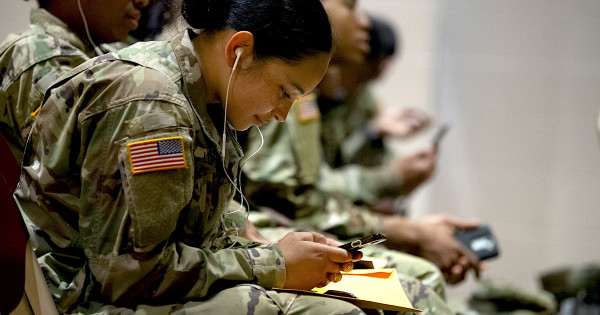

It appears we need to have a chat — and no, it’s not about the new Top Gun: Maverick trailer.
Last month, soldiers with the 504th Military Intelligence Brigade were told they were required to download an app to their personal devices, which were then inspected to confirm it was downloaded. It was meant to keep them organized, with up-to-date training schedules and weather updates.
But the app also would gain access to their contacts, their exact locations, and calendar events — a major concern for soldiers who take extra security precautions.
And last week, U.S. Army WTF! Moments reported that a Fort Riley battalion was being told the same; their command sergeant major told them during a safety briefing that they had to download the Fort Riley app to their personal devices, and were not allowed to leave “until each phone was visually inspected.”
Lt. Col. Terence Kelley, spokesperson for the 1st Infantry Division at Fort Riley, confirmed the situation to Task & Purpose.
“A Fort Riley senior leader required soldiers to download and show that they had the app on their personal devices,” Kelley said in a statement. “This was in the context of a battalion holiday safety briefing and the intent was to ensure all soldiers had the app’s emergency contact info.”
He did not identify the battalion, as the incident is being investigated.
The intentions of the app were most likely pure — keeping soldiers and their families up to date on the latest developments and with the correct information. But that doesn’t mean it’s legal. As legal experts told Task & Purpose, military leaders cannot require subordinates to provide their phone for an inspection to make sure they’ve downloaded an app.
“The only exception to the Fourth Amendment in the military context is a health and welfare inspection. Inspections of this type allow commanders to look at service members’ living quarters for safety purposes,” said Dwight Stirling, a reserve JAG officer and CEO of the Center for Law and Military Policy. “A health and welfare inspection, however, is not a proper basis to force a service member to reveal the personal contents of a phone. Data on a phone does not endanger personal safety. An act of this type constitutes a search and can only occur if there is probable cause the phone contains evidence of a crime.”
Retired Marine Lt. Col. Guy Womack, a military defense attorney based in Houston, told Task & Purpose that telling soldiers to download an app that might help with things like schedule changes “doesn’t really sound nefarious,” but requiring them to allow their phones to be inspected is “a violation of their Fourth Amendment rights.”
“Even in a normal setting, civilian or military, if you think someone may have something on their phone and you would like to look at it, if it’s a military member you have to get an officer with sufficient authority to authorize a search for that phone, and you can only do that if you can articulate that you have a reasonable belief that a crime has been committed,” Womack explained.
He also stressed caution over the data that could be accessed from apps on someone’s phone — like in the case of the 504th MI BDE.
“We’ve come into a new era where we have to worry about cell phones and how they can be used to track people without even being aware of it, and the idea that you would order an American service member to download an app that could give away their private information … there’s no place for that.”
@WTF_Judge — lawyer for USAWTFM, according to their bio — added on Twitter that there “are several ways to put a stop to the phone checks without getting to the constitutional level, not the least of which is that the CSM doesn’t have the authority to give that order.” They also said that there are other reasons for inspections in the military, aside from health and welfare which Stirling identified, including for readiness, force inspection, and more.
According to USAWTFM, permissions of the app the Fort Riley battalion was told to download included “geo locating, access to alter storage on the phone, monitoring calls, and changes to other aspects of their personal phones.”
Kelley said the app does have a location feature, but it has to be activated by each individual device; the app “is not designed to do anything with monitoring calls,” he said, though they are double-checking with the app’s vender to get clarity “out of an abundance of caution.” He also said that he isn’t aware of the app making “changes to other aspects” of the user’s phones, though they are also checking with the vender about that feature.
He added that none of the information the app might have is shared with or provided to command.
The Fort Riley soldiers are no longer being required to download the app, Kelley said, adding that because the soldiers’ phones “are personal property, Army leaders should not mandate the soldiers to download the app to their phones.”
Update: This post was updated at 11:50 a.m. on Dec. 17 with additional information.
